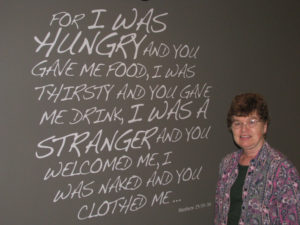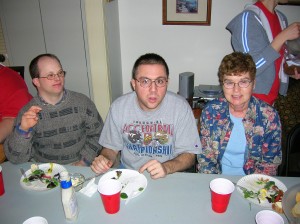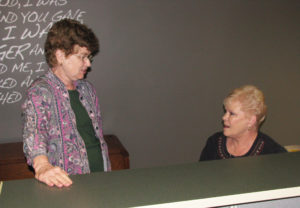Sister Jane visits with Dawt Peng, a refugee from Burma who was hired in June 2011 as an intake and referral specialist at Catholic Charities in Kansas City. Peng came from a refugee camp in Malaysia and tells of the atrocities his Chin people go through in Burma, including forced hard labor, forced military service, sexual abuse and murder. “He’s good at helping with food stamp applications, Medicaid applications and interpreting,” Sister Jane said. “I’m very happy,” Peng said. “God knows my heart, so he gave me an opportunity to help my people.”
(With refugee resettlement coming to an end during Covid-19, Sister Jane Falke began volunteering with TurnStyles Thrift Store in 2020, which is operated by Catholic Charities of Northeast Kansas.)
The quote from Matthew 25:35-36 is stenciled on the chalkboard gray wall behind Sister Jane Falke’s desk at the office of Catholic Charities of Kansas City, Kan. “For I was hungry and you gave me food, I was thirsty and you gave me drink, I was a stranger and you welcomed me, I was naked and you clothed me.”
One day a refugee who had come to the office for assistance was reading the quote slowly, word by word, until he stopped and asked Sister Jane, “What is a stranger?” Sister Jane replied, “That’s you.”
Since 2010, Sister Jane’s ministry has to been to welcome the stranger, mostly people coming to Kansas City from Burma or Bhutan, a few African nations and some Iraqis. “The U.S. government identifies people needing support as refugees or asylees,” Sister Jane said. “Catholic Charities is one of the agencies that will give support. The Catholic Conference of Bishops notifies us to see if we’ll receive them.”
It’s not a ministry this former teacher and business manager ever thought she’d do, but her easy laugh and her innate Ursuline hospitality makes her a perfect fit as the first person visitors meet when they walk through the door.
“We love having Sister Jane here, she’s great at welcoming everyone,” said Kristen Allen, director of the Kansas City Office of Refugee Resettlement. “We used to have no one at reception, it was like the Wild, Wild West, people were wandering around the hallways. She’s great at learning everyone’s name. We’re so lucky to have her.”
The Kansas City office will pick up a refugee at the airport, find living space before he/she arrives, and make a donation of furniture and clothing. “We’ll take them through the health services, and get them bus passes. We’ll teach them how to live in an apartment rather than a refugee camp,” Sister Jane said. “We do an individual employment plan to find them jobs. Federal Express, housekeeping, landscaping and restaurant work are some of the more prevalent jobs available. We provide every type of social service – rent, utilities and spending money until they get set up.”
Sister Jane points to a picture of one of the success stories of the New Roots community gardening project in Kansas City. The woman in the picture worked in the community garden for four years, and now owns her own property. Sister Jane and three other sisters bought a share in her garden, and the woman brought them four to six items each week.
The job would be easier if Sister Jane spoke another language, but she doesn’t. “I can do Namasté,” she said. “Sometimes people just stand and look at me.”
Sister Jane keeps up with 15 calendars at Catholic Charities, and she makes a small chart each morning to anticipate who is coming in so she can greet them. “I have everyone sign in,” she said. “We have a few interpreters on staff, or I rely on someone in the lobby.”
Popular languages are the Burmese dialects of Chin and Karen, and Nepali, one of the languages of Bhutan, Sister Jane said. “They know a little English. Sometimes I just look around the room and someone else pipes in. I’ve gotten pretty good at some pretty unusual interpretations of English.”
One day in early November, Sister Jane said 50 people signed in, but only seven of them were scheduled appointments.
She is proud of the work being done at Catholic Charities, especially an urban community gardening project for refugees called “New Roots.” “An agriculturalist teaches them how to raise crops. They drive people to various farmers markets, show them how to market their products, pay taxes, etc.,” she said. Sister Jane lives on Reinhardt Drive in Shawnee Mission with Sister Dee Long, and two other sisters live a short distance away, Sisters Martina Rockers and Angela Fitzpatrick. The four sisters bought a share in New Roots for 20 weeks, and a woman would bring them four to six items from her garden to eat. “They learn to grow crops that are marketable here,” Sister Jane said, which includes kale, okra, tomatoes, beets, turnips, onions, basil and cilantro.
“Jane is very passionate about her work at Catholic Charities with the refugees,” Sister Martina said. “Recently we were at a dinner party together and the conversation became focused on the encounters she has with refugees. She was so busy telling us stories that the seven of us were ready to go for dessert and she was only halfway through the main course.”
Sister Jane previously worked at a more suburban office of Catholic Charities as an administrative assistant in the counseling office, creating files and handling intake. When that office closed, she worked in the development office for six months doing data entry before moving to the more inner-city office. “I gladly came here,” she said. “Most of the time I enjoy it a lot.”
Growing up among the sunflowers
Sister Jane was an Ursuline Sister of Paola, Kan., prior to that community merging with the Ursuline Sisters of Mount Saint Joseph in 2008. She was born Teresa Elizabeth Falke and grew up in Westphalia, Kan., a farming community 100 miles from Kansas City. “Paola is in the country, but Westphalia is really in the country,” she said. The town still has a post office and a bank, and the priest for the area oversees four parishes.
She is the oldest of eight children born to Frank and Cecelia Falke, with two sisters and five brothers. “I learned to keep everyone in line,” she said. Her youngest sibling is 15 years younger. Frank Falke bought his own farm in 1936, raising some crops and livestock. Cecelia Falke raised the children and helped on the farm.
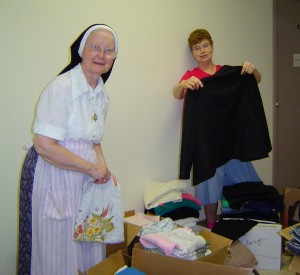
Sister Jane and her friend Sister Emerentia Wiesner fold clothes at the Paola, Kan., Motherhouse in preparation for sending supplies to Shreveport, La., following Hurricane Katrina in 2005.
“Life was fine. We always had chores to do, we milked the cows and gathered eggs,” Sister Jane said. “I did lots of housework. My mother was always pregnant. I gained a whole lot of skills at an early age.” For fun the children went fishing. They loved coloring books, checkers and board games.
Her childhood was starkly different than the one her father lived.
Frank Falke’s father was a newspaperman in Germany, but the country was in a great depression following World War I, so at the age of 6 or 7, Frank was sent to be raised in the country. Sister Jane recalls him saying, “My mother came to visit me once.” He was later sent to live with a tailor, but his parents didn’t think he was getting the education he needed, Sister Jane said. “Some priests from America were visiting, they asked him if he wanted to go to America, and he said ‘yes.”
“He came from Germany when he was 15 without his family, in 1923,” she said. “He worked on the Blaufuss family farm,” and was treated like a member of the family. One of the younger children in that family is a priest, Father Tony Blaufuss, who told Sister Jane he thought her dad was his brother.
Frank Falke was introduced to one of the nieces in the Blaufuss family, Cecelia Redeker, and the two eventually married.
“During World War II, my dad didn’t know if his parents and siblings were alive or dead,” Sister Jane said. “We’d send care packages, and my dad read the letters that came from Germany to my mother. I have a lot of those letters. My sister Jeanne had them translated after my father died, so we learned more about him and his family.” Sister Jane visited Germany with her father once, and met several of her cousins, but she doesn’t speak the language. “I was a kid during World War II, you didn’t speak German,” she said.
One of Frank Falke’s brothers, Joseph, became a priest in Germany. When German-born Cardinal Joseph Ratzinger was selected to become Pope Benedict XVI in 2005, one of Sister Jane’s cousins wrote to him asking if he knew Father Joseph Falke. “The pope wrote back saying he knew my uncle,” Sister Jane said. “They got to know one another when the pope was a theology professor and my uncle was a seminary rector. We all have a copy of the pope’s letter.”
Meeting the Ursulines
Sister Jane was taught by Benedictine Sisters at St. Therese grade school and then went to Ursuline Academy, the high school run by the Ursulines at Paola. “The Benedictines had a boarding school in Atchison about 120 miles away. Paola was closer, it was only 60 miles,” she said.
Sister Jane skipped a grade in elementary school, so she was a high school freshman at 13. “The Ursulines were totally different, there was more freedom,” she said. She recalled a time when her family built a new home, but the Benedictines were not allowed to come inside. “The Ursulines could come in your house. That really appealed to me,” she said.
“You get close to the sisters in a boarding school,” Sister Jane said. “I was attracted to the closeness to the Church. I liked being at the center of the most important thing – the Church.”
Like her father had, Sister Jane made a life-changing decision at age 15 – joining the Ursulines. “My dad was fine, my mother was reluctant, but she didn’t stop me,” Sister Jane said. “I was very mature for my age, based on my responsibilities in the family. Religious life in those days, they brought you up.”
She entered with a class of five in 1955, but is the only remaining member. This year marks Sister Jane’s 57th year as an Ursuline Sister.
She took the religious name Sister Jane Frances because her birthday was the same as the feast day for Saint Jane Frances de Chantal, Aug. 21. “They’ve moved her day a few times since then,” Sister Jane said, and it is now celebrated on Aug. 12.
Teenage teacher
Sister Jane was 19 in 1958 when she began her first teaching assignment at St. Agnes School, in Fairway, Kan., a suburb of Kansas City. “I taught first grade, I had more than 50 children,” Sister Jane said. “It was very tiring. I’d teach school all day, then have recited prayer, plus other work. There wasn’t time for anything else.”
Sister Jane stands in front of the stencil of the quote from the Gospel of Matthew concerning serving the poor. The quote is behind Sister Jane’s desk as she greets people at Catholic Charities in Kansas City.
In 1960, she moved to St. John School in the rural community of Greeley, Kan., where she taught fifth, sixth and seventh grades. “I had fewer resources, and I was teaching farmers’ children rather than doctors’ children,” she said.
Mary Best is a former sister who was in the novitiate with Sister Jane in the 1950s. “One of my early memories is when we were teachers, we had to give these achievement tests and we had about two weeks to get them graded,” Best said. “Sister Jane would grade hers right away. If she has a task to do, she goes ahead and does it.”
In 1963 Sister Jane came back to the Kansas City area of Overland Park to teach middle school age children at Queen of the Holy Rosary, her third school in five years. “We were trained on ‘detachment,’ get as involved as you can where you are, and when you leave, walk away,” Sister Jane said.
“I always liked the bigger kids better, you could get more intellectual with them,” she said. Now, she enjoys seeing the young children who come into Catholic Charities with their immigrant parents. “It makes my day,” she said.
After three years, she moved back to Paola in 1966 to become principal at Holy Trinity School. The school is just a stone’s throw from the convent. “I couldn’t get involved in the parish, I had to go back to the convent each day,” Sister Jane said. “I said, ‘I’d rather be a high school teacher.’”
Sister Jane got her wish the next year, beginning her 15-year tenure as a math teacher at Bishop Miege High School, the school the Ursulines began next door to St. Agnes. She now lives across the street from the school.
“I really liked the kids. They were crazy, rebellious times. The Vietnam War was going on, the class would decide one day to have a sit-in,” she said. “There was a real mix of economic classes, a diversity of the population. It opened the year I went to teach at St. Agnes, the Ursulines were always a part of it.”
“Sister Jane was a very creative and energetic math teacher,” said Sister Martina, who continues to teach at Bishop Miege. “She had the vitality and understanding to gently and persuasively teach students that math is a subject they can learn. Students realized she expected their attention in class and that homework was due on schedule. After she left Bishop Miege students often asked about her and commented on the good foundation she gave them to continue in upper level math courses in high school and college.”
Leadership
“I’d still be at Miege if they hadn’t elected me,” Sister Jane said. She was first elected to the Paola leadership Council in 1978, but she was able to continue teaching until 1982, when she began her first of two four-year terms as the assistant superior and treasurer for the community.
“We dealt with old buildings, and tore several down,” she said. “We gave the auditorium to the city. We started a retirement fund, and took our first steps in investment. As treasurer, I was very involved in that.”
She managed the small number of employees, and helped develop the former farm property the community owns. “I just love that sort of stuff. I never thought I’d get to do that,” she said. Sister Jane likes administration and management.
“I grew up with a dad who kept his books, he wrote down every penny he spent,” she said. “I learned that’s what you did. All the people I knew managed their business.”
From 1998-2006, she again served as assistant superior and treasurer, and was a councilor through 2008, when the merger with Mount Saint Joseph was approved. That means she was in leadership for 26 of the final 30 years of the Paola community – despite never aspiring to hold office.
“I thought, ‘I’m not holy enough for this.’ But I just said, ‘God, here I am, do what you will,” she said. “You learn God is going to find you whether you’re holy or not.”
The 1998 term focused a lot on renovating the motherhouse. “The renovation did a lot of good. We had a strong public who liked us, it galvanized them to be closer to us,” Sister Jane said. “It raised our profile. It provided a nice home for a few years. It’s kind of a shame it wasn’t used longer.”
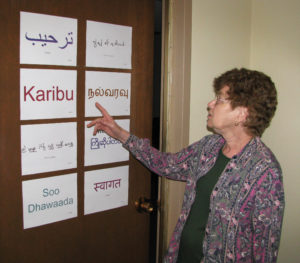
Sister Jane points to one of the signs that spells welcome in eight languages commonly spoken by refugees.
The merger in 2008 was “the accomplishment of something I’d known we should have done 20 years earlier,” Sister Jane said. “It’s providing more social opportunities for the older sisters. It was really hard for everybody, including those who are here. I’m here, I have a job, they’re not easy to get.” While she is glad to remain close to her family, several of her close friends in the community are now living at Maple Mount, including her dominoes competitors Sister Judith Osthoff and Sister Emerentia Wiesner.
“I’ll stay at Catholic Charities as long as I can. That’s as far as I can see right now,” she said. “I have good health and lots of energy. My dad lived to be 96.”
A chance to stretch her legs
In 1986, a friend of Sister Jane’s was looking for someone to facilitate a master’s program at Loyola University in New Orleans through the Diocese of Kansas City, Mo. “I got a master’s in pastoral studies with an emphasis on social justice while facilitating between 1986-2002,” she said. “I worked with three groups, four years each. It was mostly people who were working in the Church,” she said. “We’d meet for three hours once a week in the evening.”
Sister Jane ordered materials, kept attendance, collected written work and kept discussions at the appropriate level. “It put me in contact with a whole lot of people searching and finding,” she said. “I get to be on the front lines now, which is wonderful.”
Sister Martina said Sister Jane is very aware of the needs of others, and cited her work in facilitating the Loyola course as a good example. “She seems to have a real knack of knowing when others need encouragement and a boost to lift their spirits,” Sister Martina said. “Jane facilitated the Loyola Scripture Course for several years and you could see the depth of this spiritual experience in her daily life.”
In 1990, Sister Jane was elected as a councilor in leadership, which allowed her to have an outside ministry. She sent her resume to the Archdiocese of Kansas City to continue as a business manager someplace. “Business was more interesting than teaching school at that point,” she said. “I kind of had a knack for it.”
“I could have worked with the Dominican Sisters, or with Christian Brothers as a business manager, but I didn’t want to move too far away,” she said. A “very charismatic pastor” convinced her to take the position as business manager at St. Charles Parish in Gladstone, Mo., which she did from 1990-98. Gladstone is about 20 minutes from Kansas City.
“I got to know the leaders of the National Treasurers Organization, and got to consult with smaller religious groups from 1990-2004.” It was during these opportunities that she met Ursuline Sister of Mount Saint Joseph Barbara Jean Head, who was the treasurer at Maple Mount.
“I worked with groups that had financial challenges who were asking for funding,” Sister Jane said. “We’d find out what was going on, and made recommendations. I was just so pleased they allowed me to do it.”
Sister Jane also served for years on the board of the Lakemary Center, a facility the Ursulines started in 1969 for children with developmental disabilities. Adults served by Lakemary live in apartments and homes, and most are employed at work centers or in community jobs. “It was important to have sisters on the board to keep them true to their mission. It’s a fantastic organization,” Sister Jane said. She resigned as a board member when she went to Catholic Charities because she could no longer attend the board meetings. Sister Pat Lynch continues to serve on the Lakemary board.
In 2006, Sister Jane became business manager and pastoral minister at L’Arche Heartland in Overland Park, a facility for the developmentally disabled, but she left after a year. “I couldn’t make the changes needed,” she said. Her next stop was Catholic Charities in 2008.
Losing her parents
Sister Jane with two Lakemary Center residents, David and George, in 2007. Sister Jane served on the Lakemary board for many years.
Sister Jane and her siblings were blessed that their parents both lived long lives, but in 2004, both of her parents died 11 months apart. She said she and her siblings were able to care for them in their final days.
“I could go down every Thursday to help them out for a year,” she said. “That was a real blessing.”
Her mother had a stroke and died on Jan. 11, a month shy of her 83rd birthday. Her father died Dec. 6, at age 96. After her mother’s stroke, Sister Jane was able to spend more time taking care of her dad, and got him into a nursing facility for the last six months, visiting him once a week.
Her mother was a very compassionate, caring person. “She was the one who was taking care of people,” Sister Jane said. “Everyone in my family learned to cook, to create a sense of community.”
The lesson her father taught her was gratitude. “He got to come to the United States and he never forgot it,” she said. “When things are tough for me, I think of all the things I have to be grateful for.”
Free time
Sister Jane enjoys reading, crossword puzzles, going to the performing arts center and doing counted cross stitch and embroidery. “I still like board games and dominoes,” she said.
Sister Jane works the front desk at Catholic Charities with volunteers such as Jackie Hallier, right. “She’s very nice to work with,” Hallier said.
Sister Marcella Schrant served in leadership with Sister Jane in the early 1990s, and the two became good friends after that. “We’ve gone on vacation together several times, including to Mackinac Island and a trip to New Mexico (in 2010) to see the (hot air) balloon fest,” Sister Marcella said. Along with Sister Dee, the three pray together monthly as part of the sunflowers bonded group. “She’s a very prayerful person,” Sister Marcella said. For the past two Christmases, Sister Jane has invited Sister Marcella to join her at her sister’s home.
Sister Jane and Mary Best, who lives about 20 minutes away in Leawood, Kan., have remained friends through the years and usually get together for a Sunday meal once a month.
“She does a needlework that makes beautiful pictures,” Best said. “She listens to audiobooks while doing her needlework,” an allusion to what all her friends say, that Sister Jane is fun, but always efficient.
“In the 1980s, I was into bicycling and she was too,” Best said. “We took bicycle trips on the weekend, maybe 20-30 miles round trip.”
“She’s kind, and a faithful religious,” Best said. “She’s a likable person, we have common interests. She reads good spiritual books, I have that interest too, I ask for her recommendations.” Sister Jane’s favorite authors are the religious writers Joan Chittister, Sandra Schneiders and Elizabeth Johnson, and whoever is writing the latest best-seller.
“I belong to the local art museum, she goes with me at times,” Best said. “She appreciates good music and good art. You won’t find Sister Jane wasting time watching TV.”
It’s doubtful anyone could find Sister Jane ever wasting time. “I thought I would teach school all my life,” Sister Jane said. “I’m glad I’ve had lots of other things I’ve done.”
By Dan Heckel


